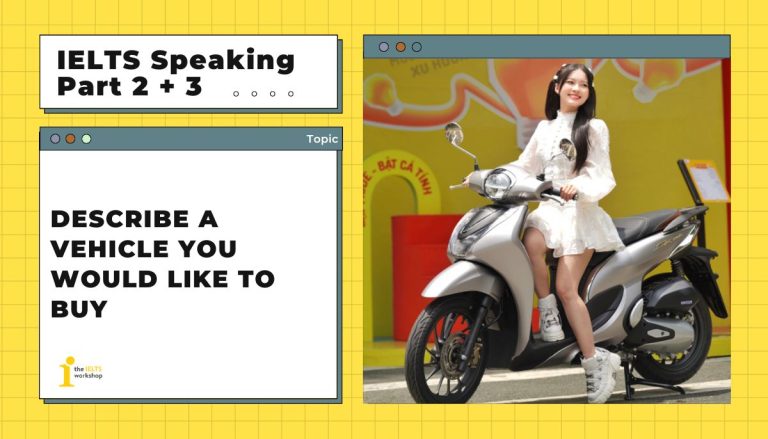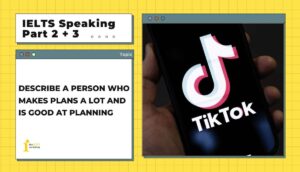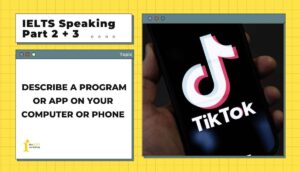Trong chuyên mục giải đề IELTS Speaking kỳ này, cùng tham khảo chủ đề: “Describe a vehicle you would like to buy” qua bài mẫu của cô Khánh Minh và cô Quỳnh Anh của The IELTS Workshop dưới đây nhé.
Part 2: Describe a vehicle you would like to buy
Describe a vehicle you would like to buy
You should say:
What kind of vehicle
Why you would like to have it
How you would get it
And explain why you would prefer this means of transport.
Dưới đây là bài mẫu cho topic “Describe a vehicle you would like to buy”.
1. Bài mẫu (Sample)
Sample 1:
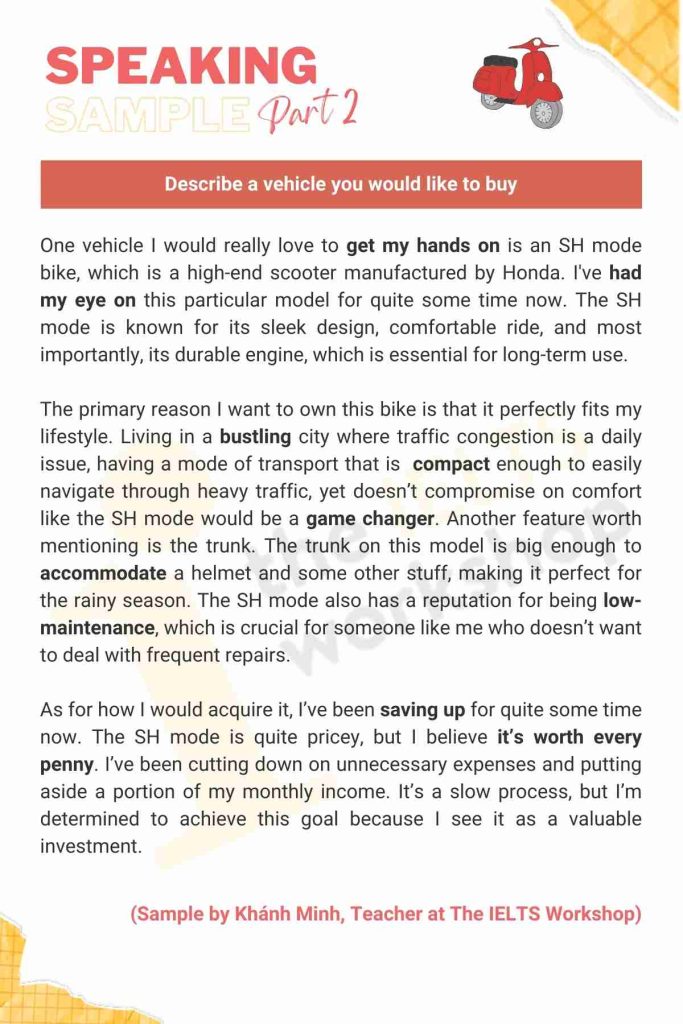
Sample 2:
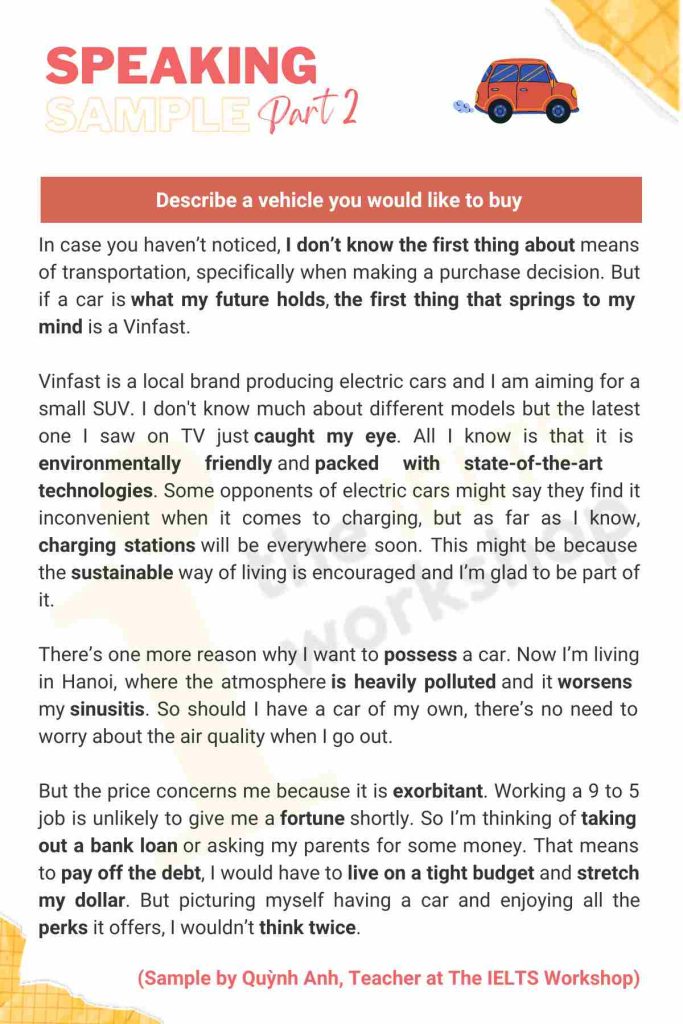
2. Từ vựng (Vocabulary)
Sample 1:
- to get my hands on (expression): có được
- To have my eye on (expression): để ý
- Bustling (adj): nhộn nhịp
- Compact (adj): gọn nhẹ
- game changer (expression): “nhân tố quyết định thay đổi”, hay một thứ gì đó có thay đổi cục diện tình hình
- Accommodate (v): chứa đựng
- low-maintenance (adj phrase): ít phải bảo trì, chăm sóc mà vẫn dùng tốt
- Save up (v phrase): để dành
- to be worth every penny (expression): đắt xắt ra miếng
Sample 2:
- I don’t know the first thing about: tôi không có kiến thức về
- what my future holds: tương lai tôi có
- the first thing that springs to my mind: thứ đầu tiên hiện lên trong đầu
- catch my eye: lọt vào mắt tôi
- environmentally friendly: thân thiện với môi trường
- packed with state-of-the-art technologies: rất nhiều công nghệ tân tiến nhất
- charging station: trạm sạc điện
- sustainable: bền vững
- possess: sở hữu
- be heavily polluted: bị ô nhiễm nặng nề
- worsen: làm tệ đi
- sinusitis: bệnh viêm xoang
- exorbitant: siêu đắt đỏ
- fortune: 1 đống tiền
- take out a bank loan: đi vay ngân hàng
- pay off the debt: trả hết nợ
- live on a tight budget: sống dè xẻn tiết kiệm
- stretch my dollar: cóp nhặt từng đồng
- perk: ưu điểm
- think twice: đổi ý
Part 3
What are the advantages and disadvantages of public and private transportation?
What are the advantages to society of having more people using mass transportation?
Why do some people have to travel a long distance every day to go to work?
What are the advantages and disadvantages of living in the centre of a city and living in the suburbs of a city?
1. What are the advantages and disadvantages of public and private transportation?
Sample 1: Public transportation has its own pros and cons. For starters, it is usually more cost-effective as it is normally cheap and you can save money on fuel, parking fees, and vehicle maintenance. Public transport also has a positive environmental impact by reducing the number of vehicles on the road, which in turn decreases traffic congestion and pollution. However, it can be less convenient. In fact, none of my family members or friends use public transport on a daily basis due to its fixed schedule and sometimes unreliability. On the other hand, private transportation provides greater flexibility and comfort, allowing individuals to travel at their own pace. Although I admit that there is a downside to it, such as environmental consequences or maintenance costs, private transport is the way to go for most people in Vietnam.
- on a daily basis (expression): hằng ngày
- fixed schedule (n phrase): lịch cố định
- Unreliability (n): sự thiếu tin cậy
Sample 2:
I think the benefits of mass transit can compensate for what is called drawbacks of private vehicles and vice versa. Speaking of environmental benefits, while commuting by bus or train is believed to help alleviate air pollution, doing the same thing by private cars contributes a vast amount of CO2 to the atmosphere. However, when it comes to privacy, owning a car means that people enjoy their space, instead of sharing it with many more on a bus. This can be particularly annoying as people may eat and talk freely in a communal space.
- mass transit: phương tiện công cộng
- compensate: bù đắp
- vice versa: và ngược lại
- commute: đi làm
- alleviate: làm giảm nhẹ
- privacy: sự riêng tư
- communal space: không gian chung
2. What are the advantages to society of having more people using mass transportation?
Sample 1: I think society would benefit greatly if people started utilizing mass transit. As I said earlier, it’s environmentally friendly, as public transit has a lower carbon footprint than private vehicles. What’s more, it reduces traffic congestion, making commutes faster and less stressful for everyone. However, for this change to happen, the government has to invest in mass transit, you know, by upgrading facilities – they’re quite deteriorated in Vietnam – and incorporating modern technology such as in-app ticket purchases.
- carbon footprint: lượng khí carbon thải ra môi trường
- Deteriorated (adj): xuống cấp
- Incorporate (v): tích hợp
Sample 2: There is an abundance of merits. First, since public transportation is scientifically reported to be more environmentally friendly, using it more often would reduce the emissions entering the atmosphere, thereby lessening greenhouse effects and global warming. Second, this trend could decrease the rate of accidents caused by human errors. As bus drivers are well-trained and better still, many metro systems around the world are monitored by computers, chances are commuters can enjoy a safe and comfortable trip to their workplaces.
- abundance: rất nhiều
- emission: khí thải
- thereby: khi đó
- well-trained: được đào tạo bài bản
- monitor: điều khiển, giám sát
3. Why do some people have to travel a long distance every day to go to work?
Sample 1: There are a host of reasons really, but I think one of the main reasons is the disparity between where people live and where job opportunities are located. For example, in many large cities, housing closer to the city center, where most jobs are concentrated, can be prohibitively expensive. As a result, people often choose to live in more affordable suburban areas, which may be far from their workplace. Another reason may be that they want to live closer to their family, and if their job is far away, they’re willing to make a trade-off of a longer commute.
- Prohibitively expensive (adv+adj): đắt đỏ
- trade-off (n): sự đánh đổi
Sample 2: I think this can be attributed to two primary reasons. To begin with, in many countries, Vietnam included, favorable employment opportunities are mostly found in one area, like metropolises where living expenditure is oftentimes costly. As a result, workers tend to live in the suburbs and spend hours traveling back and forth every day. Besides, some people may find it delightful to reside somewhere far from the city center where they can rest in tranquility after a hard day at work.
- be attributed to: đổ lỗi cho
- metropolis: thành phố lớn
- living expenditure: chi phí sinh hoạt
- oftentimes: thông thường
- back and forth: chiều đi và chiều về
- delightful: hạnh phúc
- tranquillity: sự yên tĩnh
4. What are the advantages and disadvantages of living in the centre of a city and living in the suburbs of a city?
Sample 1: I guess that the advantages of the city are the drawbacks of the suburbs and vice versa. In terms of convenience, city residents are typically close to work, shops, restaurants, and entertainment venues. Meanwhile, the longer commute to work or the city center can be time-consuming and tiring for suburban citizens. While the vibrant and dynamic atmosphere can be appealing to those who enjoy a fast-paced lifestyle, the suburbs often lack that cultural vibrancy and the variety of activities, rendering them quieter and, at times, even uninteresting. Speaking of the living condition, the suburbs are generally quieter and more spacious, with more green areas, which can be ideal for families or those seeking a peaceful environment. On the other hand, the hustle and bustle of the city can lead to noise and congestion, which might be stressful for some people.
- entertainment venues: địa điểm giải trí
- cultural vibrancy: sự sôi động về văn hoá
- Render (v): khiến cho
Sample 2:
Living in urban areas may bring a lot of benefits to city dwellers. To be specific, they can enjoy the convenience ò tthe amenities in the vicinity like schools, public transportation, parks, libraries or shopping centres. Also, a more diverse job market is usually seen there, synonymous with more chances people could grab to earn a living. But the thing is, living in a city can be draining sometimes due to its hustle and bustle. Meanwhile, the peace in suburban areas can relieve people’s stress and recharge their batteries after working hard. In addition, the expenses are reasonable for almost everyone, although they may have to travel too far to work on a daily basis.
- city dwellers: người thành phố
- amenities: tiện ích
- vicinity: khu vực
- diverse: đa dạng
- synonymous with: đồng nghĩa với
- earn a living: kiếm sống
- draining: mệt mỏi
- hustle and bustle: sự xô bồ
5. Compare the advantages and disadvantages of using mass transportation.
Mass transit has been around for centuries and offered a range of pros and cons. In terms of the former, as I mentioned earlier, taking a bus or train is a great way to protect the environment, and it is also safer for commuters, especially those without a driving license. Also, tickets are affordable for most people, and there are usually discounts for students and the elderly. However, using mass transit can be troublesome to several people. They claim that it lacks privacy and mobility. To be more specific, passengers have to share their space with many others on the same trip, and they still need to walk a few miles to their destinations. That explains why in many parts of the world with underdeveloped public transport systems, people would still go for their private vehicles.
- driving license: bằng lái xe
- affordable: rẻ
- troublesome: rắc rối
- mobility: tính cơ động
Bài mẫu bởi cô Khánh Minh và cô Quỳnh Anh – Giáo viên The IELTS Workshop
Trên đây là bài mẫu cho topic: Describe a vehicle you would like to buy. Các bạn có thể tham khảo các bài mẫu IELTS Speaking Part 2 khác của The IELTS Workshop tại đây!
Nếu bạn muốn nhận Mentor 1-1 để hoàn thiện kĩ năng Speaking của mình trước khi bước vào kỳ thi, tham khảo ngay Khóa bổ trợ từng kỹ năng IELTS của The IELTS Workshop.


